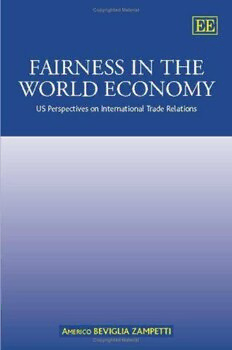
Fairness in the World Economy: US Perspectives on International Trade Relations PDF
231 Pages·2006·1.403 MB·English
Most books are stored in the elastic cloud where traffic is expensive. For this reason, we have a limit on daily download.
Preview Fairness in the World Economy: US Perspectives on International Trade Relations
Description:
‘This volume describes the birth (with all the birth defects) of the notion of fairness in the US. The extent of the author's research is quite breathtaking: not only does he delve into an infinite series of official and semi-official documents, but he also looks at case law, opinions expressed in the literature etc., to come up with an expression of (US) fairness that does not suffer from selection bias. But this is only half what the author has accomplished through his work. He goes on to examine how US fairness has been exported to international institutions (such as the GATT/WTO regime) and demonstrates how, once discussed and shaped among all trading partners, it has come back to the US in a different form. The book thus provides both the "inside out" and the "outside in" perspective. It will prove invaluable for the political scientist, the economic historian and the lawyer alike.’ – Petros C. Mavroidis, Edwin B. Parker Professor of Law, Columbia Law School, US and University of Neuchatel, Switzerland & CEPR ‘This book represents a significant scholarly contribution to the field of international political economy, with particular respect to the evolution of the multilateral trading system. The author engages effectively with the current debate concerning the conflict between the legalistic foundations of the multilateral trading system underpinned by the equality of nation states and the demands for fair trade on the basis of inter-personal equity. It is a coherent and well-researched book on a critically important issue that has not received the significant attention that it deserves within the field of international trade policy.’ – Robert Read, Lancaster University Management School, UK In an international context, fairness is particularly important, since only a system which is perceived by its participants as fair can command acceptance and compliance. The main focus of this study is to investigate the development of the notion of fairness in US trade policy and law and the impact this notion has on international trade discussions and rule-making, and especially on the formation of the multilateral trade regime. The contention of the author, Americo Zampetti, is that fairness concerns, which have been present in the US trade policy debates and treaty practice since the Republic’s inception, have contributed to shaping these debates and practice over the years, both at home and abroad. These concerns were finally thrust upon the international scene through inclusion in the multilateral trade regime after World War II. As such, the book forms part of the broader debate over the costs and benefits of globalization. The methodological approach chosen is that of an ‘intellectual history’, which seeks to understand the origin of a particular idea, trace its trajectory within the international trade policy discourse and evaluate its impact on policy and regime formation. Fairness in the World Economy will be a fascinating and insightful read for academics, students, researchers and policymakers with an interest in international trade issues as well as international affairs, relations and economics.
See more
The list of books you might like
Most books are stored in the elastic cloud where traffic is expensive. For this reason, we have a limit on daily download.
